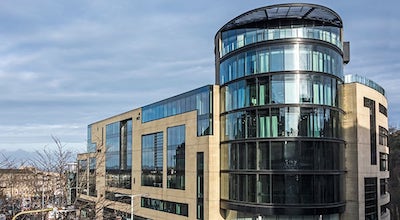By Mark McSherry
Edinburgh fund management giant Baillie Gifford has explained its approach and attitude to investing its £235 billion of assets in the current era of dramatic climate change and global warming.
In its sixth annual “Positive Change Impact Report” the Edinburgh investment group said: “We need to reverse the devastating and far reaching impact that human activity is having on our planet.
“Greenhouse gas (GHG) emissions continue to grow, fuelling global warming at the same time as the global population expands, putting more stress on earth’s systems.
“It is no longer insightful to state that these are inextricably linked.
“While the challenges are vast, we choose not to dwell in eco-anxiety.
“Human ingenuity fills us with hope and optimism that these challenges can be addressed.
“Our team is in a privileged position to frequently meet passionate business leaders who are tackling them head on.”
On August 4, Baillie Gifford hit back against climate activist Greta Thunberg, who pulled out of the Edinburgh International Book Festival alleging that Baillie Gifford, a sponsor of the event, invests “heavily in the fossil fuel industry.”
Baillie Gifford partner Nick Thomas replied by pointing out: “We are not a significant fossil fuel investor. Only 2% of our clients’ money is invested in companies with some business related to fossil fuels.
“This compares to the market average of 11%. Of those companies, some have already moved most of their business away from fossil fuels, and many are helping to drive the transition to clean energy.”
A group of authors has since called on the Edinburgh International Book festival to cut ties with Baillie Gifford, with some writers threatening to boycott the event.
In its “Positive Change Impact Report” Baillie Gifford said that as transport, heating and heavy industry become more electrified there is a need to balance the sustainability, affordability and reliability of the energy supply.
The fund manager said modern societies put a great deal of stress on water, food, energy and minerals and it highlighted the need to promote “technological, digital and behavioural solutions” which enable resource conservation and preservation.
Baillie Gifford said: “GHG emissions continue to rise and are now 54 per cent higher than in 1990.
“In order to meet the Paris Agreement’s 1.5 degrees Celsius goal, by 2030, GHG emissions must reduce by 45 per cent from 2022 levels according to the modelled pathways published by the Intergovernmental Panel on Climate Change (IPCC).
“The Covid-19 pandemic provided a unique lens on the bleak challenge ahead; humanity barely met the IPCC’s annual target in 2020 when the world’s economic and social activities abruptly halted.
“We are thankfully on a path to significant growth of renewable electricity generation. As transport, heating and heavy industry become more electrified, there is a need to balance the sustainability, affordability and reliability of the energy supply.
“This is known as the energy trilemma which will, given the intermittent nature of renewable power generation, require innovative technological solutions.
“All IPCC pathways now depend on carbon removal, which will be a mix of engineered solutions, such as direct air capture, and nature-based solutions. Restoring natural carbon sinks, such as forests, is a cost-effective near-term solution for carbon removal.
“However, the carbon stored in these ecosystems is vulnerable to disturbances such as wildfires, which release carbon back into the atmosphere. Furthermore, it would require forests five times the size of India to suck up the carbon or, to put it another way, more than all the farmland on the planet.
“This points to another huge challenge facing humanity and intrinsically linked to our need to decarbonise energy systems – stemming the dangerous impact that human activity is having on nature.
“The world is experiencing the largest loss of plant and animal life since the dinosaurs. The 2022 UN Biodiversity Conference reached an agreement to protect 30 per cent of the planet by 2030.
“This was an encouraging development, but one which does not negate the need to find solutions to prevent industrial activities from causing habitat destruction.
“Resource efficiency is another critical challenge, and one which is absolutely fundamental to addressing those described above.
“Our complex modern societies put a great deal of stress on water, food, energy and minerals, the availability of which is critical for sustaining life and socioeconomic progress.
“We need to promote technological, digital and behavioural solutions which enable resource conservation and preservation to ensure that future generations have the same opportunities as we have.”
